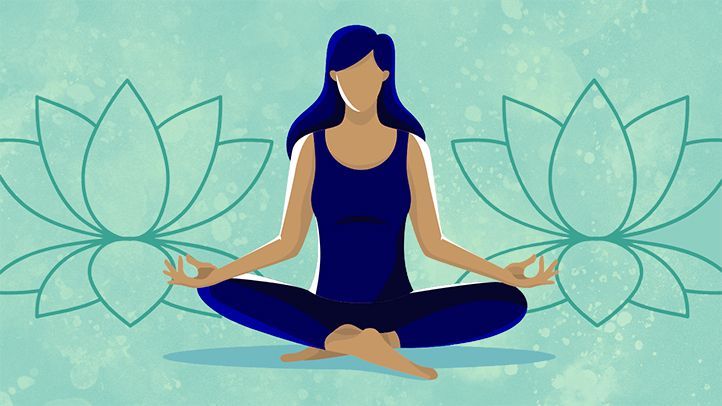Acute stress disorder is a mental health condition that can occur after someone has experienced or witnessed a traumatic event. This can include events such as car accidents, natural disasters, sexual assault, or terrorist attacks. Symptoms of acute stress disorder usually develop within the first month after the traumatic event, but can sometimes occur later. If you are experiencing symptoms of acute stress disorder, it is important to seek help from a mental health professional. In this blog post, we will discuss everything you need to know about this condition.
Contents
- 1 What Is Acute Stress Disorder?
- 2 Signs of Acute Stress Disorder
- 3 Causes of Acute Stress Disorder
- 4 Negative Impacts of Acute Stress Disorder
- 5 Diagnosis of Acute Stress Disorder
- 6 Treatment of Acute Stress Disorder
- 7 How To Deal With Acute Stress Disorder?
- 8 How To Help Someone With Acute Stress Disorder?
- 9 Conclusion
- 10 A Word From Therapy Mantra
What Is Acute Stress Disorder?
 Acute stress disorder is one of the most common psychological disorders. It is characterized by a range of symptoms that can occur after a traumatic event. These symptoms can include flashbacks, nightmares, anxiety, and feeling detached from friends and loved ones. Acute stress disorder can have a significant impact on your ability to function in everyday life. If you are experiencing any of these symptoms, it is important to seek professional help.
Acute stress disorder is one of the most common psychological disorders. It is characterized by a range of symptoms that can occur after a traumatic event. These symptoms can include flashbacks, nightmares, anxiety, and feeling detached from friends and loved ones. Acute stress disorder can have a significant impact on your ability to function in everyday life. If you are experiencing any of these symptoms, it is important to seek professional help.
Acute stress disorder is treatable. With proper treatment, you can regain control of your life and begin to heal the emotional damage caused by the trauma. If you or someone you know is struggling with acute stress disorder, please reach out for help. There are many resources available to support you on your journey to recovery.
Signs of Acute Stress Disorder

There are many signs of acute stress disorder, and they can vary from person to person. Some people may experience these are :
Racing Heartbeat
Racing Heartbeat is one of the signs and symptoms of acute stress disorder. When people experience a traumatic event, their body goes into fight-or-flight mode. This causes an increase in heart rate and blood pressure. Heatbeat can also be one thing that people who have PTSD.
Shortness of Breath
Shortness of breath is another sign of acute stress disorder. This is because the body is preparing for fight-or-flight mode by getting more oxygen to the muscles. Shortness of breath can also be a symptom of PTSD. Shortness of breath also is caused by hyperventilating, which is when a person breathes too fast. It also can be a sign of a panic attack.
Sweating
Sweating is another sign of acute stress disorder. This is because the body is preparing for fight-or-flight mode by getting rid of any excess heat. Sweating gives it away to cool down so that it can better focus on the situation at hand. If you find yourself sweating more than usual, it could be a sign that your body is under stress.
Heart Palpitations
Heart palpitations are another common symptom of acute stress disorder. This is because the heart is working overtime to pump blood to the muscles in preparation for fight-or-flight mode. If you find yourself having heart palpitations, it’s important to see a doctor to rule out any other possible causes.
Headaches
Headaches are another common symptom of acute stress disorder. This is because the body is releasing chemicals that can lead to headaches and migraines. If you find yourself getting headaches more often, it could be a sign that your body is under stress.
Nausea
Nausea is another common symptom of acute stress disorder. This is because the body is releasing chemicals that can lead to nausea and vomiting. If you find yourself getting nauseous more often, it could be a sign that your body is under stress.
Intrusive Thoughts
Intrusive thoughts are another common sign of acute stress disorder. This is when people can’t stop thinking about the traumatic event. It can be very distressing and make it hard to focus on anything else. If you find yourself having intrusive thoughts, it’s important to seek help from a mental health professional. u
There can be many other signs and symptoms of acute stress disorder, so it’s important to talk to a doctor if you think you may be experiencing any of them. If you are experiencing any of these symptoms, please seek professional help.
Causes of Acute Stress Disorder

There are many causes of acute stress disorder, but most cases are triggered by a traumatic event. Some of these events are:
Traumatic Event
Trauma is something that happens to you that is so overwhelming and causes such terror, that it changes the way you think about yourself and the world around you. A traumatic event can be a one-time occurrence, like a car accident, or it can be something that happens over and over again, like being abused. Sometimes there may be many different events that cumulatively add up to be traumatic.
Abuse
Abuse is another thing that can cause acute stress disorder. Abuse can be physical, sexual, or emotional. It is when someone uses their power to control or hurt you. Abuse can happen once or it can happen over and over again. There can also be many things that cumulatively add up to be abusive.
Natural Disasters
Natural disasters can also cause acute stress disorder. These can include things like hurricanes, earthquakes, floods, and tornadoes. Natural disasters can be very frightening and often lead to the loss of property and even life. Disasters may also mean that it is hard to get help or that you have to live in difficult conditions.
War
War can also be a cause of acute stress disorder. War is often very violent and there is often a lot of death. People who experience war may see things that are so horrible that it is hard to forget them. They may also worry about their safety and the safety of their loved ones. There may also be a lot of noise and chaos during the war, which can be very overwhelming.
Loss
Loss can also cause acute stress disorder. Loss can be the death of a loved one, the loss of a job, or the loss of a home. Loss is often sudden and can be very hard to cope with. People who experience loss may feel like they are all alone in the world and that they will never be able to recover from what has happened. It can also live upto its name and be a traumatic event.
Negative Impacts of Acute Stress Disorder

There are many negative impacts of acute stress disorder. Some of these are:
Anxiety
Anxiety can be a very debilitating emotion. It can make it hard to concentrate, sleep, or eat. It can also lead to physical symptoms like a racing heart, sweating, and shaking. Sometimes it may also feel like you are going to die or that you are going crazy.
Depression
Depression is another negative impact of acute stress disorder. Depression can make it hard to get out of bed, to enjoy activities that you used to enjoy or to see the good in life. Depression can also lead to physical symptoms like fatigue and aches and pains. It can also make you feel hopeless and helpless.
Flashbacks
Flashbacks are when you relive the traumatic event over and over again. You may see the event happening in your mind, or you may feel like you are back in the moment. Flashbacks can be very scary and make it hard to function in everyday life. They may also trigger other symptoms like anxiety and depression.
Avoidance
Avoidance is when you try to avoid anything that reminds you of the traumatic event. This can include people, places, things, or even thoughts and feelings. Avoidance can make it hard to live your life normally and may lead to other problems like social isolation and depression.
Diagnosis of Acute Stress Disorder
 The diagnosis of acute stress disorder is very important to know because it can be a predictor of future mental health problems, such as post-traumatic stress disorder. Furthermore, early diagnosis and treatment can help prevent the development of chronic stress disorders.
The diagnosis of acute stress disorder is very important to know because it can be a predictor of future mental health problems, such as post-traumatic stress disorder. Furthermore, early diagnosis and treatment can help prevent the development of chronic stress disorders.
There are many ways to diagnose acute stress disorder, but the most common is through a structured clinical interview. This type of interview allows the clinician to assess the individual’s symptoms and determine whether they meet the criteria for diagnosis.
Other methods of assessment include self-report measures, such as questionnaires and scales, and physiological measures, such as heart rate and skin conductance.
Doctors have some flexibility when it comes to diagnosing acute stress disorder. The Diagnostic and Statistical Manual of Mental Disorders, Fifth Edition (DSM-V) lists two sets of criteria for diagnosis:
The first set of criteria requires that the individual experience a traumatic event and have nine symptoms from any of the following categories:
– intrusion
– avoidance
– negative mood or affect
There are some questionnaires online that can help you measure your symptoms, such as the Acute Stress Disorder Scale (ASDS) and the Clinician-Administered PTSD Scale for DSM-IV (CAPS-IV).
Treatment of Acute Stress Disorder

The treatment of ASD can be difficult, as the disorder is characterized by avoidance behaviors. The goal of treatment is to help the individual feel more comfortable and in control. Treatment may include:
Exposure Therapy
Exposure therapy is a type of behavioral therapy that helps people confront their fears. The goal is to help people become less afraid of their triggers and more able to cope with them. This therapy also helps people to understand and manage their reactions.
Cognitive Behavioral Therapy
Cognitive-behavioral therapy (CBT) is a type of therapy that helps people change their thoughts and behaviors. CBT can be used to help people with ASD manage their symptoms. This therapy can help people learn how to cope with their triggers, manage their reactions, and make positive changes in their lives.
Medication
There is no one specific medication that is used to treat ASD. However, some medications can be used to help people with ASD manage their symptoms. These medications can help with anxiety, depression, and sleep problems. Medications can also be used to help people with ASD cope with their triggers and reactions. Some of these medications are:
SSRIs (Selective Serotonin Reuptake Inhibitors)
SNRIs (Serotonin and Norepinephrine Reuptake Inhibitors)
Benzodiazepines
Tricyclic antidepressants
Beta-blockers”
Hypnotherapy
Hypnotherapy is another treatment option that can be used to help people with ASD. This therapy uses relaxation and visualization techniques to help people manage their symptoms. Hypnotherapy can also help people with ASD learn how to cope with their triggers and reactions.
This type of therapy also gives people the opportunity to explore their thoughts and feelings in a safe environment.
Psychotherapy
Psychotherapy is a type of therapy that helps people with ASD understand their thoughts and feelings. This therapy can also help people with ASD learn how to cope with their symptoms. Psychotherapy can be used in combination with other treatments, such as exposure therapy or CBT.
Support Groups
Support groups are another option that can be used to help people with ASD. These groups provide an opportunity for people to share their experiences and learn from others who are dealing with similar issues. Support groups can also help people with ASD find new ways to cope with their symptoms.
ASD is a disorder that can be difficult to treat. However, there are many options available that can help people with ASD manage their symptoms. If you or someone you know is dealing with ASD, there are many resources available to help.
How To Deal With Acute Stress Disorder?

There are many ways in dealing with acute stress disorder, and the most important is to get help from a mental health professional.
Meditation
Meditation is one way that can help you focus on the present moment and let go of worry about the future. There are a lot of different types of meditation, so find one that suits you. Sometimes it can be helpful to download a meditation app or listen to guided meditations. There are many types of meditation, so find one that works for you.
Yoga
Yoga is another way to focus on the present moment and let go of worry about the future. Yoga can also help to increase flexibility and strength. There are many different types of yoga, so find one that suits you. You can often find yoga classes at your local gym or community center.
Exercise
Exercise is a great way to reduce stress and improve your overall health. Exercise releases endorphins, which have mood-boosting effects. A moderate amount of exercise is the key to reducing stress without adding to it. Find an activity that you enjoy and make it part of your routine. There are a lot of different types of exercise, so find one that works for you.
Talk To Someone Who Understands
It can be helpful to talk to someone who understands what you’re going through. This could be a friend, family member, therapist, or support group. Talking about your experiences can help you feel more connected and less alone. It’s important to find someone who will listen without judgment and respect your privacy.
Write Down Your Thoughts
Writing down your thoughts can help you to process them and make sense of them. It can also be a way to release stress and pent-up emotions. Writing can be therapeutic and help you to understand your thoughts and feelings better. You don’t have to share what you write with anyone if you don’t want to.
Find Creative Outlet
Creative outlets can be a great way to express yourself and reduce stress. Some creative outlets include painting, drawing, writing, photography, and music. Find one that suits you and allow yourself to be creative. There are no rules when it comes to creativity, so let your imagination run wild.
Take Time For Yourself
It’s important to make time for yourself to do things that make you happy. This could be anything from reading, taking a bath, going for a walk, or watching your favorite TV show. Taking time for yourself is an important part of self-care and can help you reduce stress. Make sure to schedule in some “me” time every day or week.
Disconnect From Technology
Disconnecting from technology can help you to focus on the present moment and reduce stress. It can be difficult to do, but it’s important to take a break from your phone, computer, and social media. Spend some time doing something that doesn’t involve screens. Go for a walk, read a book, or talk to a friend.
Set Boundaries
It’s important to set boundaries with people in your life. This includes saying no when you need to and setting limits on what you’re willing to do. Setting boundaries can help you to protect your time and energy. It can also help you to feel more in control of your life.
Practice Self-Compassion
Self-compassion is an important part of managing stress. It involves being kind and understanding to yourself, even when you make mistakes. It also includes forgiveness and letting go of perfectionism. Practicing self-compassion can help you to be more gentle with yourself and reduce stress. There are many resources available to help you learn more about self-compassion.
How To Help Someone With Acute Stress Disorder?

Helping someone with acute stress disorder can be difficult. It’s important to be patient and understand that they are going through a lot. There are many ways you can help, including:
Listen Without Judgement
Listening without judgment is one of the most important things you can do. It’s important to let the person talk and express their feelings. Try to be understanding and respectful of their experiences. Sometimes just being there to listen is enough. There are also many resources available to help you learn more about how to listen without judgment.
Offer Support
Offering support is another important way you can help. This could involve helping with practical tasks, such as childcare or cooking. It could also involve emotional support, such as being there to talk or offering a shoulder to cry on. Sometimes just knowing that someone is there for them can be a huge help. Sometimes, people with acute stress disorder just need someone to be there for them.
Encourage Treatment
If the person is willing, encourage them to seek treatment. This could involve therapy, medication, or both. Treatment can help the person to manage their symptoms and start to feel better. It’s important to respect the person’s decision if they don’t want to seek treatment. You can still offer support in other ways. You can also encourage them to speak to a doctor about their options.
Try To Avoid Triggers
Triggers are anything that can make the person’s symptoms worse. It’s important to avoid triggers if possible. Triggers could include certain places, people, or situations. If you’re not sure what the person’s triggers are, you can ask them. Sometimes, avoiding triggers is not possible. In this case, it’s important to have a plan in place to help the person deal with their symptoms.
Be Patient
Patience is something that you should try to have when helping someone with acute stress disorder. It can be a long and difficult journey for the person. They may have good days and bad days. It’s important to be there for them, no matter what. There can be many ups and downs, but eventually, the person will start to feel better.
Give Them Space
Sometimes, people with acute stress disorder just need some space. This could mean giving them time to themselves or not pushing them to talk about their experiences. It’s important to respect the person’s wishes and give them the space they need. Space can be a very important part of the healing process.
Conclusion
Acute stress disorder is a real and serious condition that can have a significant impact on a person’s life. If you or someone you know is experiencing symptoms of ASD, it’s important to seek professional help. With treatment, people with ASD can recover and go on to live happy and fulfilling lives.
If you or someone you care about is struggling with acute stress disorder, don’t hesitate to reach out for help. There are many resources available to support you through this difficult time. Remember, you are not alone. For more information about acute stress disorder, please visit us.
A Word From Therapy Mantra
Your mental health — Your psychological, emotional, and social well-being — has an impact on every aspect of your life. Positive mental health essentially allows you to effectively deal with life’s everyday challenges.
At Therapy Mantra, we have a team of therapists who provide affordable online therapy to assist you with issues such as depression, anxiety, stress, workplace Issues, addiction, relationship, OCD, LGBTQ, and PTSD. You can book a free therapy or download our free Android or iOS app.


